Hibiscus tea reveals incredible aromatherapy magic, enhancing your mood and relieving stress. Its rich antioxidants combat oxidative stress, while its calming aroma helps to ease tension and promote relaxation. Sipping hibiscus tea can invigorate your senses, reduce fatigue, and foster emotional balance. You'll also enjoy the delightful flavor when blended with complementary herbs like mint or ginger, perfect for a revitalizing boost. Plus, brewing techniques guarantee you capture all the fragrant benefits. As you explore the many ways to incorporate hibiscus into your wellness routine, you'll uncover even more surprising secrets about this lovely tea.
Origins of Hibiscus Tea
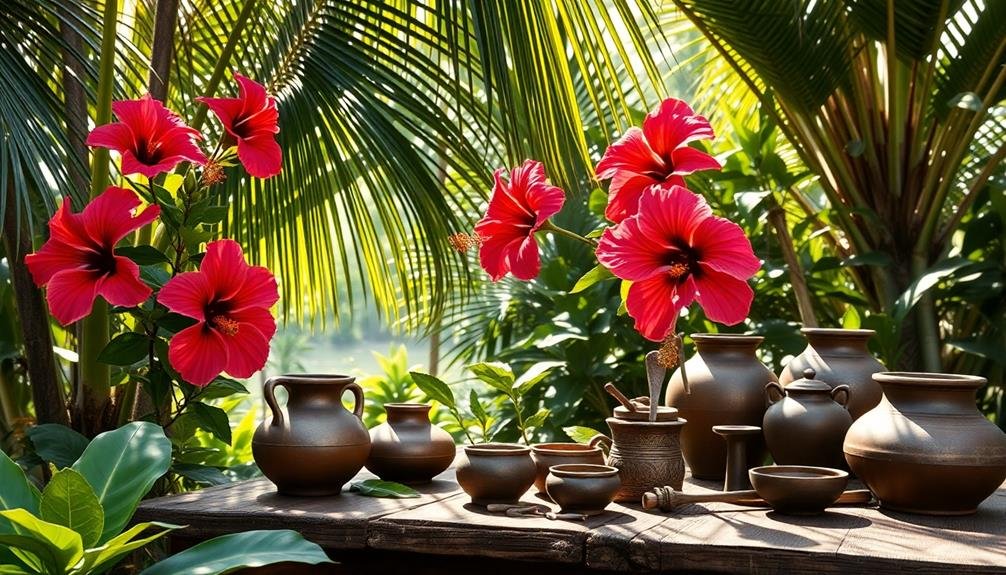
Hibiscus tea, often celebrated for its vibrant color and tangy flavor, has roots that stretch back centuries. You might be surprised to learn that this delightful beverage hails from the hibiscus plant, native to tropical and subtropical regions around the world.
Ancient Egyptians were among the first to brew hibiscus tea, using it not only for its invigorating taste but also for its health benefits, which they believed contributed to longevity.
As you explore the origins, you'll find that hibiscus tea gained popularity across various cultures. In West Africa, it became known as "Bissap," enjoyed for its cooling properties in the heat.
Meanwhile, in the Caribbean, it's often served with a hint of ginger and lime, showcasing its versatility.
The drink made its way to the Americas through trade routes, where it quickly captured the hearts of many.
Today, hibiscus tea continues to thrive globally, cherished for its unique flavor and potential health benefits.
Aromatherapy and Its Benefits
Exploring the world of aromatherapy can be a transformative experience, as it harnesses the power of scents to enhance your well-being. By incorporating essential oils and fragrant herbs, aromatherapy offers a variety of benefits that can positively impact your physical and emotional health.
When you inhale the soothing aromas, your brain releases neurotransmitters that can elevate your mood, reduce stress, and promote relaxation. You might find that scents like lavender or eucalyptus help you unwind after a long day, while citrus oils can uplift your spirits and energize you.
This practice also supports mental clarity and focus, allowing you to tackle daily tasks with renewed vigor.
Moreover, aromatherapy can aid in alleviating physical discomfort. Certain scents, like peppermint or ginger, may help relieve headaches and digestive issues. You can easily integrate these scents into your routine through diffusers, inhalers, or topical applications, making it a versatile approach to wellness.
Incorporating aromatherapy into your life can be a delightful journey of self-care, enhancing your mood and overall health.
Key Components of Hibiscus
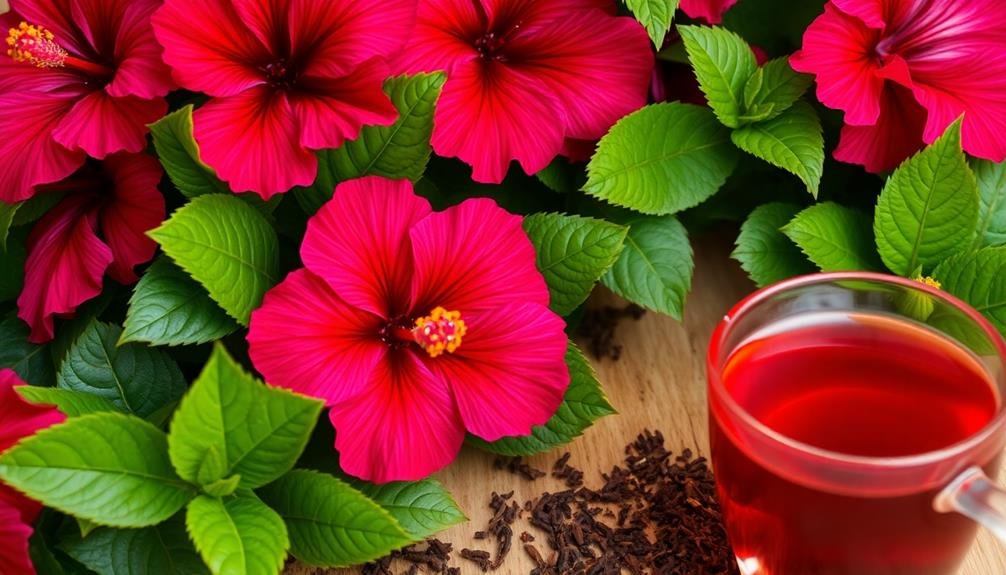
When considering the benefits of aromatherapy, it's important to recognize the unique components of hibiscus that can enhance your experience. Hibiscus, primarily known for its vibrant red petals, contains several key elements that contribute to its therapeutic properties. One of the standout components is anthocyanins, powerful antioxidants that can help combat oxidative stress in your body. These compounds not only give hibiscus its striking color but also support overall health.
Additionally, hibiscus is rich in vitamin C, which can boost your immune system and promote skin health. You'll also find organic acids like citric and malic acids, which can aid digestion and encourage a healthy metabolism. The presence of flavonoids in hibiscus also plays a role in its anti-inflammatory effects, making it a valuable addition to your wellness routine.
Furthermore, hibiscus has natural diuretic properties, which can help flush toxins and reduce bloating. By understanding these components, you can appreciate how hibiscus tea can serve as a multifaceted tool in your aromatherapy journey, providing not just delightful flavors but also a wealth of health benefits.
Hibiscus and Mood Enhancement
The uplifting aroma of hibiscus tea can greatly impact your mood, offering both emotional and mental benefits. When you indulge in a cup of hibiscus tea, you're not just enjoying its delicious flavor; you're also tapping into its mood-enhancing properties. The vibrant notes of hibiscus can invigorate your senses and promote feelings of joy and relaxation.
Here's a quick overview of how hibiscus can enhance your mood:
| Benefit | Explanation | How to Enjoy |
|---|---|---|
| Increased Energy | Hibiscus tea stimulates your senses, reducing fatigue. | Drink in the morning |
| Enhanced Positivity | The tea's bright color and aroma can uplift your spirits. | Savor during breaks |
| Emotional Balance | Its antioxidants may help balance mood swings. | Enjoy in the afternoon |
Incorporating hibiscus tea into your daily routine can create a positive feedback loop for your mood. The ritual of brewing and sipping this delightful tea can become a moment of mindfulness, allowing you to connect with your emotions and elevate your overall well-being. So, why not treat yourself to a cup today?
Stress Relief Through Aromatherapy
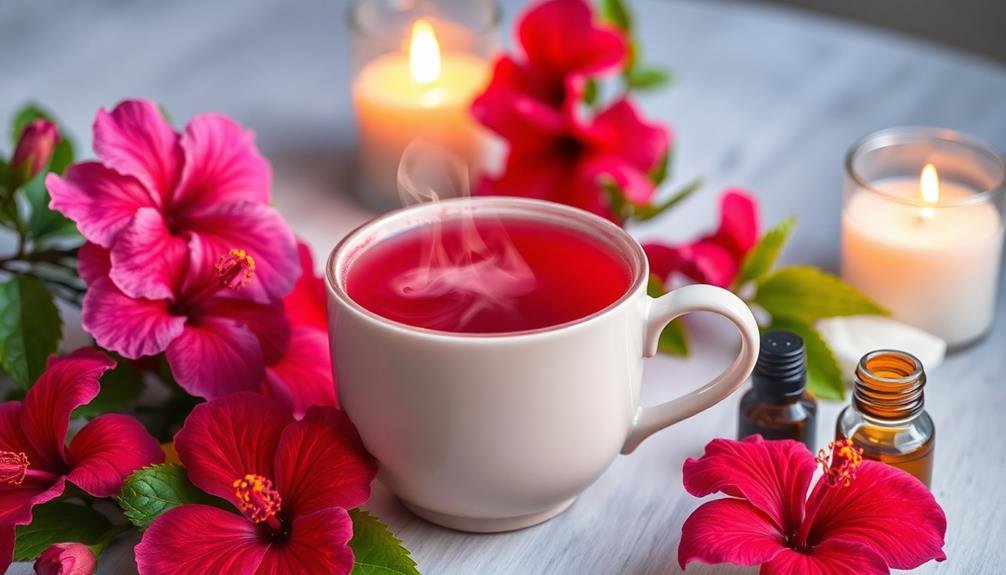
When you're feeling overwhelmed, hibiscus tea can be your go-to for relaxation.
Its calming properties work wonders in easing tension and promoting peace of mind.
Calming Properties of Hibiscus
Many people find solace in the calming properties of hibiscus, especially when it comes to stress relief through aromatherapy. This vibrant flower isn't just visually appealing; it also harbors essential compounds that promote relaxation and tranquility. When you inhale hibiscus's soothing aroma, it can help lower your heart rate and reduce anxiety, creating an environment conducive to calmness.
The natural antioxidants in hibiscus tea, such as flavonoids, play a significant role in combating stress. They help your body manage oxidative stress, which can accumulate during challenging times. Sipping warm hibiscus tea can amplify these effects, as the heat and flavor create a comforting ritual that signals your body to unwind.
You might also notice that hibiscus offers a revitalizing taste, making it a delightful beverage to enjoy while you take a moment for yourself. Whether you're at home or on the go, keeping a cup of hibiscus tea nearby can serve as a gentle reminder to breathe and relax.
Embracing these calming properties can transform your day, allowing you to navigate stress with a sense of peace and serenity.
Aromatherapy Techniques for Relaxation
Incorporating aromatherapy techniques can elevate the calming effects of hibiscus tea, enhancing your relaxation experience. To start, choose essential oils known for their soothing properties, like lavender or chamomile. Add a few drops to a diffuser while you sip your tea to create a serene atmosphere.
You can also make a calming massage oil by mixing a carrier oil, such as sweet almond oil, with your favorite essential oils. Gently massaging this blend into your skin can help release tension and promote a sense of peace.
Another technique is to create a relaxing bath. Add a few drops of your chosen essential oils to warm water, allowing the aromas to envelop you as you unwind. Pair this with your hibiscus tea for an indulgent self-care ritual.
Boosting Immunity With Hibiscus
Hibiscus tea, known for its vibrant color and tart flavor, can be a powerful ally in boosting your immunity. Packed with antioxidants, hibiscus is rich in vitamin C, which plays an essential role in strengthening your immune system. When you sip on this invigorating tea, you help your body fend off infections and illnesses.
Moreover, hibiscus has anti-inflammatory properties that can support overall health. By reducing inflammation, you're less likely to experience chronic diseases that can weaken your immune response. Drinking hibiscus tea regularly can also promote healthy circulation, ensuring your immune cells efficiently travel throughout your body.
In addition to its physical benefits, the calming aroma of hibiscus tea can help reduce stress. Lower stress levels can positively impact your immune system, making it more resilient to threats.
So, when you brew a cup of hibiscus tea, you're not just enjoying a delightful beverage; you're actively supporting your body's defenses.
Incorporate hibiscus tea into your daily routine to experience these benefits. Whether you drink it hot or iced, this delightful tea can become a significant part of your wellness journey.
Hibiscus Tea for Better Sleep
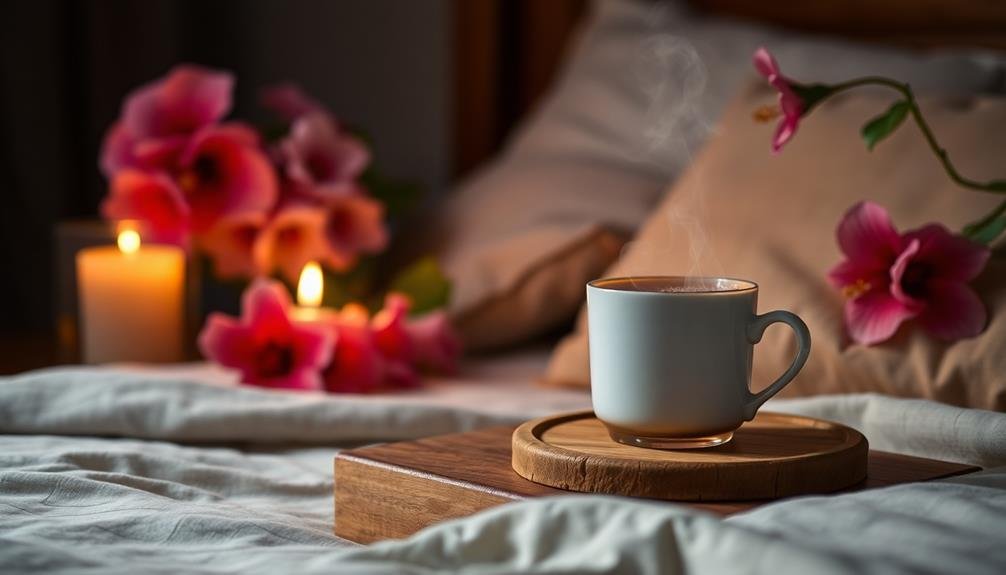
The soothing properties of hibiscus tea can be your ticket to a restful night's sleep. Known for its calming effects, hibiscus tea helps reduce anxiety and stress, allowing your mind to unwind after a long day. Drinking a cup before bedtime can signal your body that it's time to relax and prepare for sleep.
Packed with antioxidants, hibiscus tea may also help regulate your sleep cycle. Its ability to lower blood pressure can contribute to a more tranquil state, making it easier for you to drift off. Plus, the tart flavor can be a invigorating alternative to caffeine-laden beverages, which can disrupt your sleep patterns.
To make the most of hibiscus tea, try brewing a warm cup about an hour before bed. You might even want to add a touch of honey or lemon for added flavor.
As you sip your tea, take a moment to practice deep breathing or meditation, enhancing the calming effects.
Incorporating hibiscus tea into your nightly routine can transform your sleep experience, helping you wake up feeling invigorated and rejuvenated. So, why not give it a try and see how it impacts your nights?
Enhancing Focus and Clarity
If you're looking to boost your mental alertness, hibiscus tea can be a game changer.
Its invigorating properties help reduce mental fatigue, allowing you to stay sharp throughout the day.
Plus, incorporating it into your mindfulness practices can further enhance your focus and clarity.
Boosting Mental Alertness
Releasing your mental potential can be as simple as sipping on a cup of hibiscus tea. This vibrant herbal infusion not only tantalizes your taste buds but also helps boost your mental alertness. Packed with antioxidants and essential vitamins, hibiscus tea can sharpen your focus and enhance clarity, making it easier to tackle tasks with precision.
When you enjoy hibiscus tea, you're likely to experience several benefits:
- Improved cognitive function: The rich phytonutrients in hibiscus can support brain health and foster better memory retention.
- Mood elevation: The natural compounds in hibiscus may uplift your spirits, creating a more conducive environment for focused work.
- Hydration: Staying hydrated is vital for peak brain performance, and hibiscus tea provides a flavorful way to keep your fluids up.
Incorporating hibiscus tea into your routine can be a game-changer, especially during those busy workdays or study sessions.
Reducing Mental Fatigue
A cup of hibiscus tea can work wonders for reducing mental fatigue and enhancing your focus and clarity. When you sip this vibrant brew, you're not just enjoying its invigorating flavor; you're also tapping into its natural properties that help sharpen your mind. The antioxidants found in hibiscus tea combat oxidative stress, which can cloud your thoughts and drain your energy.
When mental fatigue sets in, it's crucial to recharge without overwhelming yourself. Hibiscus tea is caffeine-free, making it an ideal choice for those sensitive to stimulants. Instead of reaching for that second cup of coffee, opt for hibiscus tea to help you regain your mental edge. The rich, tangy taste invigorates your senses, providing a gentle lift that promotes better concentration.
Incorporating hibiscus tea into your routine can create a calming ritual that signals to your brain it's time to focus. Whether you're working on a project, studying for exams, or tackling daily tasks, this herbal infusion can help clear the mental fog and restore your cognitive function.
Promoting Mindfulness Practices
Sipping hibiscus tea not only refreshes your mind but also sets the stage for deeper mindfulness practices. As you enjoy this vibrant drink, you're inviting clarity and focus into your daily routine. The floral aroma and tangy flavor can help ground you, making it easier to embrace the present moment.
To enhance your mindfulness experience, consider these practices:
- Set Intentions: Before sipping, take a moment to set an intention for your mindfulness session. This could be focusing on your breath or simply being aware of your surroundings.
- Mindful Sipping: Pay attention to the warmth of the tea cup in your hands, the steam rising, and the flavors as you take each sip. This sensory awareness can deepen your connection to the moment.
- Reflect: After your tea, spend a few minutes reflecting on how you feel. Journaling your thoughts can help clarify your mind and reinforce your mindfulness journey.
Balancing Emotions With Aromatherapy
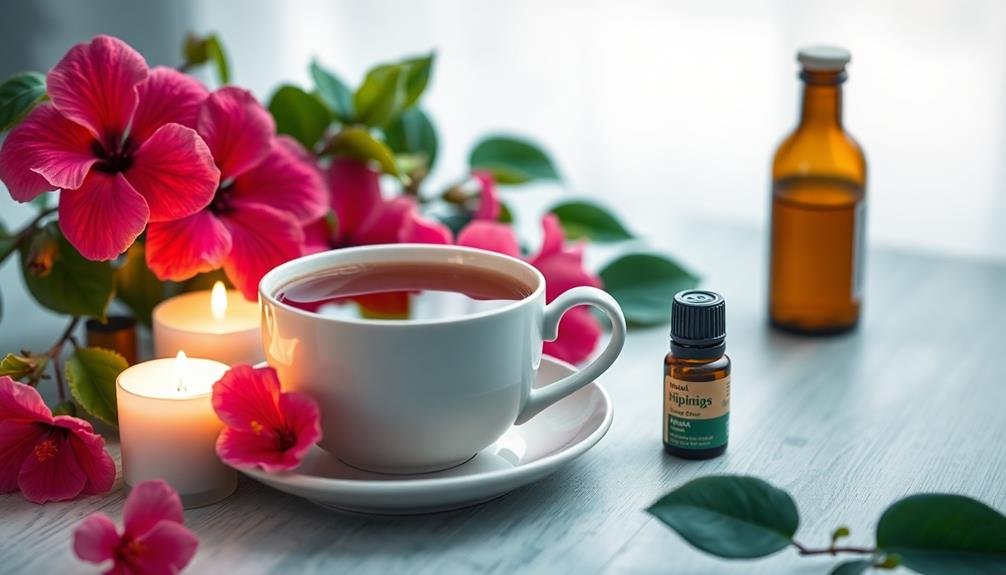
Many people find that balancing emotions can be a complex journey, but aromatherapy offers a natural path to clarity and calm. By harnessing the power of scents, you can create an environment that nurtures emotional well-being. Hibiscus tea, combined with essential oils, can elevate your mood and help you reconnect with your feelings.
Here's a quick reference table to guide you in choosing essential oils that complement hibiscus tea:
| Emotion | Essential Oil |
|---|---|
| Anxiety | Lavender |
| Sadness | Bergamot |
| Anger | Frankincense |
| Stress | Ylang Ylang |
Start by brewing a cup of hibiscus tea, allowing its rich flavor to awaken your senses. As you sip, incorporate your chosen essential oil into a diffuser or mix it with a carrier oil for a calming massage. This combination not only amplifies the soothing effects of hibiscus but also promotes emotional balance.
DIY Hibiscus Tea Blends
Creating your own hibiscus tea blends can enhance the emotional benefits you've gained from aromatherapy. By experimenting with different flavors and ingredients, you can tailor your tea to suit your mood and needs.
Here are some simple ideas to get you started:
- Citrus Twist: Add a splash of fresh lemon or orange juice to your hibiscus tea for a revitalizing zing. The citrus notes uplift your spirits and provide a burst of energy.
- Spicy Warmth: Incorporate a pinch of cinnamon or ginger to create a cozy blend that warms your soul. These spices not only add flavor but also promote relaxation and comfort.
- Minty Freshness: Toss in some fresh mint leaves for a cooling effect. Mint not only complements hibiscus beautifully but also helps in clearing the mind and enhancing focus.
Feel free to adjust the ratios of hibiscus and your chosen ingredients until you find the perfect balance.
Making these blends can also be a fun way to engage with friends or family, turning tea time into a delightful experience that nourishes both body and spirit.
Enjoy the process!
Complementary Herbs for Synergy
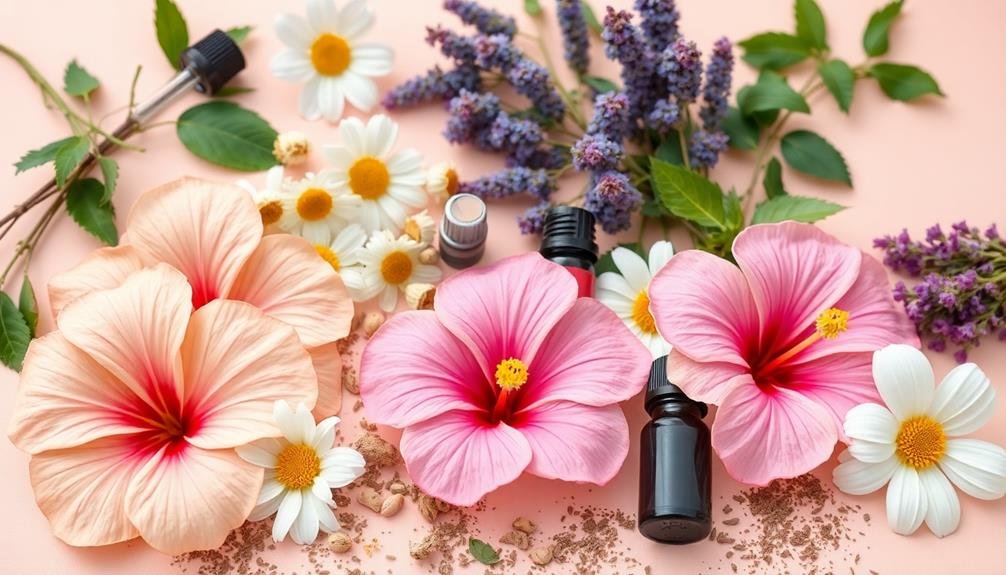
Enhancing your hibiscus tea with complementary herbs can elevate both the flavor and therapeutic benefits of your brew. Combining hibiscus with herbs like mint, ginger, or lemongrass can create a delightful and healthful drink.
Mint adds a revitalizing twist, promoting digestion and cooling effects, perfect for those hot days. Ginger, on the other hand, brings a warm, spicy kick while also supporting your immune system and soothing any nausea.
If you want to explore floral notes, consider adding chamomile. It complements hibiscus well and is known for its calming properties, making your tea a perfect evening ritual.
You might also try combining hibiscus with rosemary; this herb not only adds an aromatic touch but also enhances cognitive function and reduces stress.
Don't forget about adding a touch of cinnamon. This spice harmonizes beautifully with hibiscus, offering warmth and potentially regulating blood sugar levels.
Experimenting with these herbal combinations can lead to unique flavors and increased health benefits, allowing you to tailor your hibiscus tea to your personal preferences and wellness goals.
Enjoy the process of discovering which combinations resonate best with you!
Preparing Hibiscus for Aromatherapy
When preparing hibiscus for aromatherapy, you'll want to start by selecting high-quality hibiscus flowers to guarantee the best aroma.
Next, consider the brewing techniques that can enhance the scent, making it more potent and enjoyable.
Selecting Quality Hibiscus Flowers
Selecting quality hibiscus flowers is crucial for effective aromatherapy. You'll want to verify you're using the best blooms to maximize the benefits of their aroma and properties. Fresh, vibrant flowers not only enhance the scent but also contribute to a more potent infusion.
Here are a few tips to help you choose the right hibiscus flowers:
- Color and Appearance: Look for deep red or bright pink petals, which indicate freshness and higher anthocyanin content. Avoid wilted or browning flowers.
- Aroma: Fresh hibiscus should have a sweet, tangy scent. Take a moment to smell the flowers; if they lack fragrance, they may not be ideal for aromatherapy.
- Source: Opt for organic hibiscus flowers if possible. They're free from pesticides and chemicals, guaranteeing you're using a product that's safe for your health and well-being.
Brewing Techniques for Aroma
Brewing hibiscus tea for aromatherapy involves a few simple yet effective techniques that can elevate its aromatic qualities. Start by using dried hibiscus flowers, ensuring they're of high quality for the best fragrance. Use a clean tea kettle or pot to avoid any lingering smells from previous brews.
Next, measure about one tablespoon of dried hibiscus for every cup of water. Bring the water to a boil, and then remove it from heat. Pour the hot water over the hibiscus flowers and cover the container to trap the steam, which helps to release the essential oils.
Let it steep for about 10 to 15 minutes; the longer it steeps, the richer the flavor and aroma will be. Once steeped, strain the tea and consider adding a sweetener like honey or agave to enhance the taste, making it more enjoyable.
For those seeking a more potent aroma, try adding complementary herbs like mint or lemongrass during the steeping process. Finally, enjoy your brewed hibiscus tea warm or chilled, and take a moment to savor its delightful scent, which can uplift your mood and promote relaxation.
Essential Oil Extraction Methods
To effectively prepare hibiscus for aromatherapy, understanding essential oil extraction methods is crucial. These methods allow you to harness the vibrant properties of hibiscus, creating an aromatic experience that can enhance your well-being.
Here are three popular extraction methods you might consider:
- Steam Distillation: This technique involves steaming the hibiscus flowers, capturing the essential oils as they vaporize. The steam cools and condenses back into liquid, separating the oil from water.
- Cold Pressing: Although more common for citrus fruits, this method can be adapted for hibiscus. It involves mechanically pressing the flowers to release their oils without applying heat, preserving their delicate aroma.
- Solvent Extraction: If you want to extract more oil without high heat, this method uses a solvent to dissolve the oils from the plant material. Afterward, the solvent is evaporated, leaving behind a concentrated extract.
Choosing the right extraction method depends on your needs and the desired quality of the essential oil.
Safety and Precautions
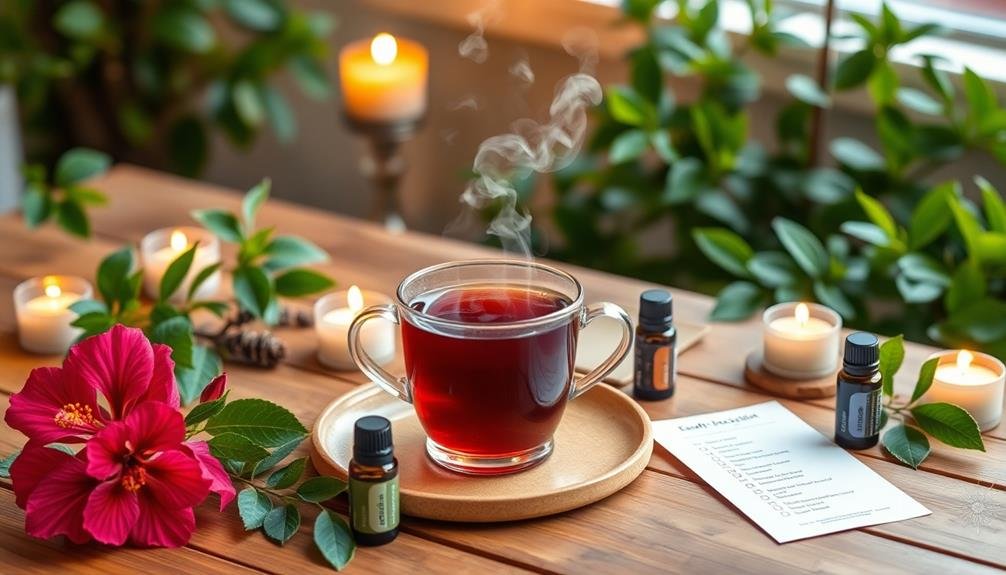
When considering hibiscus tea for aromatherapy, it is essential to be aware of safety and precautions. While hibiscus is generally safe, some individuals may experience allergic reactions or sensitivities. If you're pregnant, nursing, or have medical conditions like low blood pressure, consult your healthcare provider before using hibiscus tea, as it may interact with medications or exacerbate conditions.
Here's a quick reference table to help you understand hibiscus tea's safety considerations:
| Consideration | Details |
|---|---|
| Allergies | Possible allergic reactions in some users |
| Pregnancy/Nursing | Consult a doctor before use |
| Blood Pressure | May lower blood pressure; monitor levels |
| Medication Interactions | Can interact with diabetes or hypertension meds |
Always start with a small amount to assess your body's reaction. If you notice any side effects, discontinue use immediately. Staying informed helps you enjoy the benefits of hibiscus tea safely and effectively.
Frequently Asked Questions
Can Hibiscus Tea Be Used in Skincare Routines?
Yes, hibiscus tea can be great for your skincare routine! It's rich in antioxidants and vitamins, helping to hydrate and brighten your skin. Just brew it, cool it down, and use it as a rejuvenating toner.
What Are the Best Times to Drink Hibiscus Tea?
You should drink hibiscus tea in the morning for a revitalizing start and in the afternoon for an energizing boost. Avoid it close to bedtime, as its acidity might disrupt your sleep. Enjoy the benefits!
Does Hibiscus Tea Have Any Side Effects?
Hibiscus tea can cause side effects like lowered blood pressure or stomach upset for some people. If you're pregnant, nursing, or on medication, it's best to consult your doctor before enjoying this herbal delight.
How Does Hibiscus Tea Compare to Other Herbal Teas?
When you compare hibiscus tea to other herbal teas, you'll notice it's tart and invigorating. It offers unique benefits, like supporting heart health, while many others focus on relaxation or digestion. You'll definitely enjoy its distinct flavor!
Can Hibiscus Tea Be Consumed Cold or Hot?
Absolutely, you can enjoy hibiscus tea both cold and hot! It's invigorating served chilled with ice, or soothing when brewed warm. Experiment and find your favorite way to savor its unique flavor and benefits!
In Summary
Incorporating hibiscus tea into your aromatherapy routine can reveal a world of soothing benefits. From its rich origins to its mood-enhancing properties, hibiscus is a powerful ally in your quest for relaxation and well-being. By blending it with complementary herbs, you can create delightful, aromatic experiences tailored just for you. So go ahead, brew some hibiscus tea, and let its magic work wonders in your life, bringing you peace and balance with every sip.

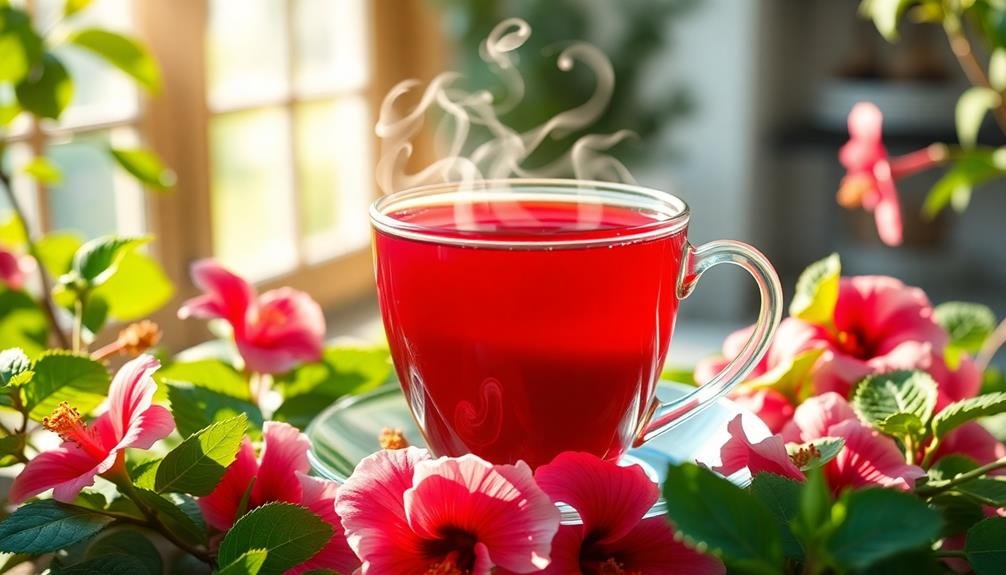
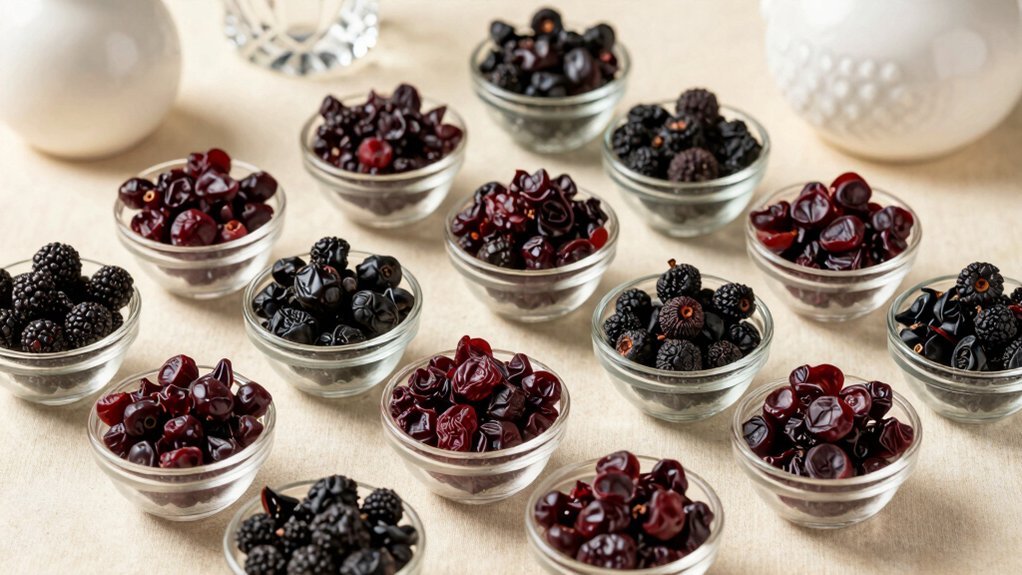
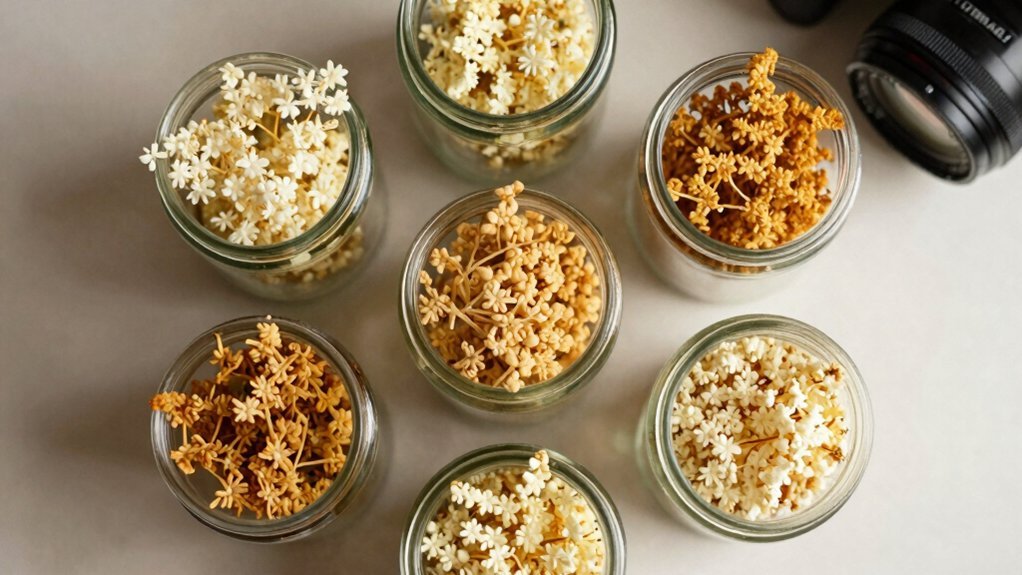

Leave a Reply